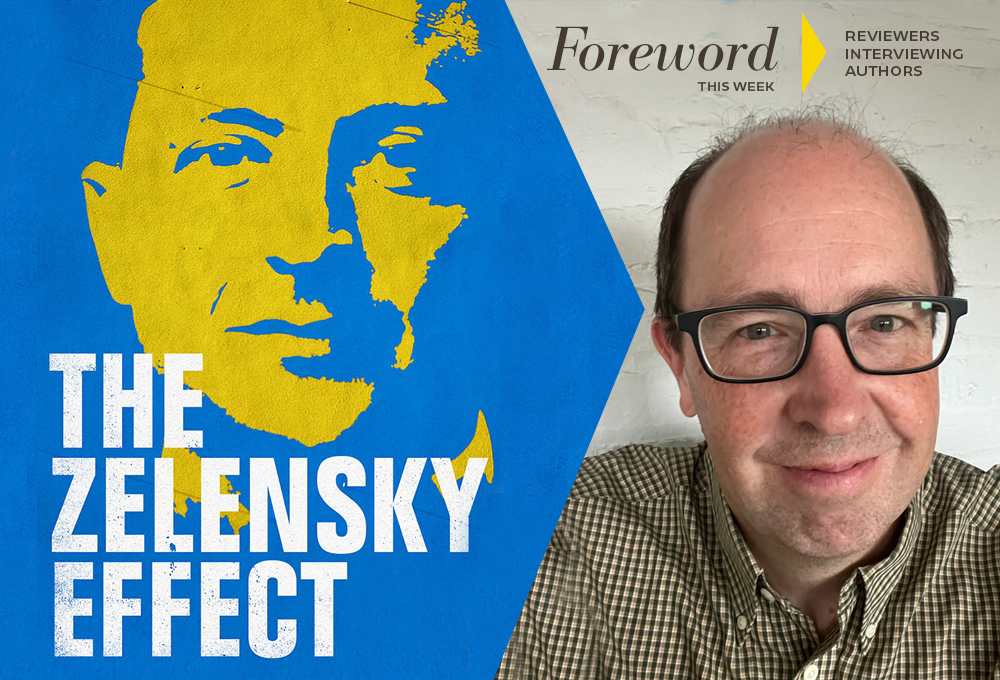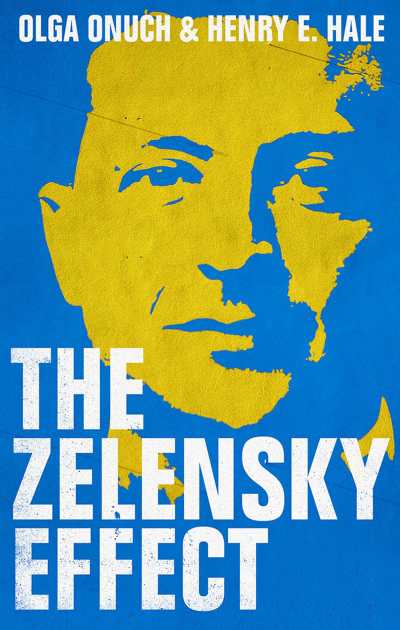Reviewer Rachel Jagareski Interviews Henry Hale, Co-author of The Zelensky Effect

By the day—420 or so since the war started—our admiration for Volodomyr Zelensky has grown and now it resembles something close to what a typical teenage girl felt about Elvis in 1959. Here’s a guy who wakes up one winter’s morning and soon realizes he’s being hunted in the streets of Kyiv by Russian special forces, Wagner Group mercenaries, and Chechen warlord Ramzan Kadyrov’s most deadly assasins. What does he do: hunker down, taunt his enemies on Twitter, and brush off CIA help to leave the country. Remember, US intelligence believed that Ukraine would fall to Russia in less than four days. Few gave Zelensky or his country a chance.

Yep, we’ve been deeply affected by the former comedian’s courage, as have millions and millions of others. Seeking to measure just what Zelensky means to Ukraine and the world, today’s guest, Henry Hale, and his co-author, Olga Onuch, wrote The Zelensky Effect—and when a copy crossed our editor-in-chief’s desk, she assigned the Foreword review to Rachel Jagareski. Shortly thereafter, we got to work setting up the following conversation.
The 2019 Ukrainian presidential election featured a large number of candidates and as you note, one of the most seemingly unlikely prospects, Volodomyr Zelensky, won. Can you elaborate about what made this young comic entertainer, Russian-speaking, Jewish native of the industrial southeast appeal so strongly to an overwhelming majority of Ukrainian voters?
This was one of Ukraine’s most remarkable elections, where someone completely new to electoral politics surged to the largest margin of victory in independent Ukraine’s history. And what Zelensky did brilliantly was to present himself as both new and familiar. He was new to electoral politics, but millions of television viewers were intimately familiar with him.
The key is what this “familiarity” actually comprised. Most obviously, it was name recognition through the roof, as one of the country’s biggest TV stars. But much more fundamental was a key set of messages that he was very well known for advocating throughout his entertainment career, especially since Russia had annexed Crimea and fomented insurgency in eastern Ukraine in 2014.
These were messages of firm European orientation, a vision of Ukrainian national identity based on common experiences and citizenship rather than specific languages or cultural characteristics, a call for ordinary Ukrainians to take responsibility for their country in their own private lives, and an inveighing against endemic corruption driven by elites but unwittingly supported by ordinary people themselves through everyday behaviors he was calling on them to change as part of this civic duty. These themes featured consistently in his evening televised variety shows as well as his famous Servant of the People television series. So when Zelensky advocated them while seeking the presidency, people understood all this to be authentic, not as simply as lines he was reading in a cynical attempt to capture the presidency.
Crucially, these very messages were extremely popular, putting Zelensky in much better sync with the popular mood than any of his opponents, most notably the sitting president he defeated.
Of course, Zelensky’s communications skills were an important part of his 2019 election victory, too. He is arguably a virtuoso in this regard. One of his earliest proudest achievements was to lead his underdog team from a hardscrabble Ukrainian city to defeat the best teams from Russia and throughout the post-Soviet space in the televised competitive circuit for Club of the Funny and Quick-Witted (KVN in Russian). Well practiced from an early age in crafting sharp messages that would resonate with audiences, he took to new social media as they appeared like a fish to water. In the 2019 election, he was thus far ahead of his rivals in knowing that social media could be key to reaching and inspiring audiences both old and new, and he has used this successfully to win votes as well as to communicate with his people in wartime.
Actors and television stars have also become presidents of the United States and other countries. Do you think that their communication skills, social media presence, and sense of political theatre give them essential advantages that other more politically experienced leaders lack? Do you envision more and more actors-turned-world-leaders in the future?
Communication with the nation is one of the most important jobs performed by a president, and campaigns in part serve to test how well candidates can perform this task. Those who clearly have such skills, often thought about as charisma, certainly have big advantages in elections.
These skills alone, though, are typically not enough. Of course, there are a few exceptions, demagogues who have no other serious qualificiations and can win office through deception and demogoguery. But in most cases, communications skills work best when they combine with other leadership assets that people tend to like. These can include experience, the substance of the larger message being communicated, senses of moral character, and specific policy positions. Candidates also typically need to be able to navigate their way through the “infrastructure” of politics, the world of big donors, media moguls, and political gatekeepers that can weed many candidates out.
In the book, we show how Zelensky in fact had many of these other traits prior to running for the presidency. These included having a longstanding clear message and leadership experience in the worlds of big business and media politics. This was often overlooked since he was best known for his acting roles, leading many people (especially in the West and in Russia) initially to underestimate him as a leader.
So I don’t think Zelensky’s rise signals we’re likely to see too many ordinary TV stars rise to the top of politics, but it definitely shows that a promising political future could await those who also cultivate a deep sense of substance and experience even if they are new to electoral politics.
We have just passed the one-year anniversary of Russia’s invasion of Ukraine. Zelensky and Ukraine have been impressively resilient and unified in their resistance to the mightier Russian military. How important has Zelensky’s decentralized military decision-making style been to this effort?
Hugely important. One kind of experience he clearly lacked upon entering the presidency was military experience, and if he had tried to micromanage the military, my strong guess is that this would have significantly weakened Ukraine’s resistance. Instead, his strength has been in cultivating a sense of empowerment among people.
In the military itself, this has meant following through with 2014-era reforms that (with Western support) helped give commanders on the ground more autonomy to make decisions based on circumstances they directly observe without having to wait for OK’s from the top. This reform was a break from the Soviet military past, a break not yet made by Russia, a fact that partly explains why Russia’s military has underperformed compared to Ukraine’s.
At the same time, Zelensky’s presidency has also consistently emphasized empowering the people at the local level, which follows up on another 2014-era reform that he deepened: political decentralization. This reform has been very important in supporting the grassroots national defense mobilization of the population, which has directly strengthened Ukraine’s military and complicated Russia’s military actions.
One danger for Ukraine, though, is that war tends to generate calls for concentrated authority as a way of ensuring national unity. This could put at risk some of the gains Ukraine has experienced from decentralization in both the military and public administration.
Though President Zelensky has been steadfast in rallying national and international support for Ukraine during this last year, he was already physically and mentally tested by several years of pushback to many proposed policy changes, by the COVID pandemic, and by reported attempts to harm him and his family members. Do you have any insight into how he recharges and keeps from being worn down by all of this?
He has called himself a coffee-maniac, so I would think caffeine probably plays a certain role. But more seriously, this question is very hard to answer since the burdens indeed seem so high. His prior life indicates he is generally a person of high energy, someone used to working round the clock, with a stubborn streak. And I imagine that adrenaline runs very high for someone in such a position at such a time. Most fundamentally, though, it is clear from his entertainment programming long before he became president that he is a strong patriot of Ukraine. And without doubt, he finds strong support in his family. When you combine his beliefs and family support with his energy and his driven personality, I think you get someone who is able to push through the highs and lows.
The last year has shown how important Ukrainian exports are to the global food market, particularly to poorer countries in Africa and Asia. However, intermittent Russian blockades of Ukraine’s Black Sea ports have only added to global food insecurity. Do you think Zelensky should be more visible about this issue to garner support from the UN and nations that depend on these vital grain and oil exports?
I agree this is a major global consequence of Russia’s invasion, and it is certainly something that should be gaining Ukraine more support around the world than it is. My understanding is that Ukraine is already doing what it can to emphasize this issue. Russia, though, counters with its own narratives and misinformation, blaming Ukraine itself for the same outcome. To support this effort, Russia also has a more extensive diplomatic infrastructure in many of these places, where Ukraine often must combine representation to several countries in a single embassy location. Russia can also offer impoverished countries cheaper gas or other products to incentivize at least their “neutrality” in the conflict. Hopefully the US, UK, and others can help Ukraine’s message resonate more strongly worldwide.
Do you envision a Ukrainian victory and what might it look like? What do most Ukrainians want for their country’s future?
I do think Ukraine is likely ultimately to win, though exactly when or how is hard to say. I see two primary scenarios. One is a very long and grinding war; prior to 2022, for example, the war had already raged on in the Donbas for nearly eight years, resulting in well over 10,000 deaths. Ukrainians have resolve and Western military arms on their side, but Russia has the sheer force of numbers now that President Vladimir Putin has taken to mobilizing hundreds of thousands of young Russians to throw into the meat grinder for his expansionist plans. The other scenario, though, is that Russian military failure and Ukrainian gains could, at some point, trigger an unraveling of the Putin regime. This is one reason why this spring and summer are so important: If Ukraine’s planned counteroffensive achieves major successes, the “unraveling” scenario in Russia becomes much more likely, though it may take some time to play out.
For peace, most Ukrainians are not willing to accept anything less than full restoration of their boundaries as internationally recognized (including by Russia) upon gaining independence in 1991, and they also seek reparations from Russia and prosecution of those responsible for Russia’s war crimes. Bigger-picture, though, Ukrainians see their country’s future as prosperous and European. While largely symbolic at this point, the EU’s granting of Ukraine candidate membership status last year was very important to many in Ukraine as a sign of hope for the future and a commitment on the part of its government to undertake needed reforms. Hope is thus very high now in Ukraine that it will truly one day become a “normal” European country.
Rachel Jagareski
